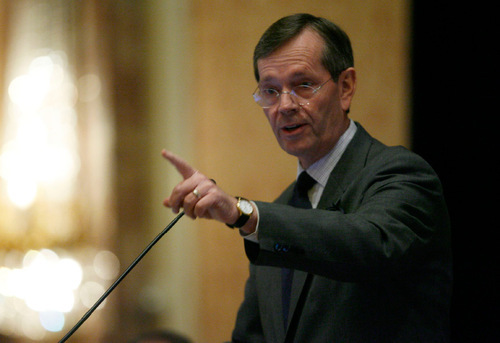This is an archived article that was published on sltrib.com in 2011, and information in the article may be outdated. It is provided only for personal research purposes and may not be reprinted.
Former Utah Gov. Mike Leavitt will on Monday defend an independent panel's recommendations for revamping the Global Fund to Fight AIDS, Tuberculosis and Malaria and urge the fund's board to take action to protect its future.
"The fund is more vulnerable now than it has ever been in its history, more fragile than the board has been willing to acknowledge," Leavitt said in an interview. "If they fail to act, the fund will wither and it will create a global health catastrophe. People will die, and a lot of them."
Leavitt, who will appear at a special meeting of the Global Fund's board in Geneva, was co-chairman of the seven-member reform panel with Botswana's former president Festus Mogae.
Created in 1993 to coordinate and bankroll global, emergency disease-fighting efforts, the $22 billion fund has dispensed anti-viral drugs to more than 1 million AIDS sufferers, delivered 200 million anti-malarial bed nets and trained health care workers around the world.
Developing nations and large philanthropy groups, such as the Gates Foundation, are its major contributors.
But a global financial crisis, coupled with evidence uncovered last year of loose financial controls and fraudulent payments to corrupt vendors in some recipient countries, imperil the organization.
Leavitt served in President George W. Bush's cabinet as head of the Environmental Protection Agency and the Department of Health and Human Services. As HHS Secretary, he became steeped in strategies to combat global pandemics, and he was asked by fund leadership to help chart a new future.
Reviewers zeroed in on 40 of the fund's 150 recipient countries, visiting 12 in person for a ground-level view of their progress.
The United States is the fund's largest contributor, investing $1.3 billion a year. That pales in comparison to the $15 billion this country funnels directly to anti-AIDS and anti-malarial efforts in countries with infrastructures that have proven strong enough to handle the money.
But Leavitt believes the fund's more diffuse spending model is still valuable and salvageable if the board embraces austerity measures to better manage risk, measure results and streamline its grant approval process.
The board needs to remold itself, said Leavitt, explaining that the balance of power now swings too far toward recipient countries. And it needs to deal with grant recipients in a differentiated way, more thoroughly accounting for expenditures in low-functioning countries while granting more flexibility to trusted nations, he said.
"The organization was formed for a noble purpose and for the most part has had positive results," Leavitt said. "Now it's time for it to turn its attention from being an emergency responder to creating a long-haul, sustainable response."
At Monday's special meeting, the fund's board is expected to consider the panel's advice and begin work on a action plan. At a regular meeting in November, it will "consider larger changes to the organization's governance structure, strategy and work processes," it said in a statement.
Leavitt's appearance in international coverage of the panel, his involvement in Mitt Romney's presidential campaign, and his recent surfacing as one of the nominees for University of Utah president mark a return to a higher profile for the three-term former governor.
But Leavitt said he is not planning a return to the national stage. "I had 16 great years of public service and I'm operating under the assumption that it's time for me to do private service," he said.
His globe-trotting may enhance the visibility of his consulting company, Leavitt Partners, which advises clients in health care, the environment and trade.
The company is Leavitt's prime focus, he said, in addition to aiding the Romney campaign and his continued involvement in the online college he founded, Western Governor's University.
"I've studied health care systems on every continent. There's something to be learned from many of them," said Leavitt, noting he has "strong views" about how the U.S. could fix what's broken with its health system while preserving what works.
"But my job now," he said, "is to look at all the world cultural and technology trends and come up with not what we think should happen, but what we think is going to happen."
kstewart@sltrib.com Twitter: @kirstendstewart



